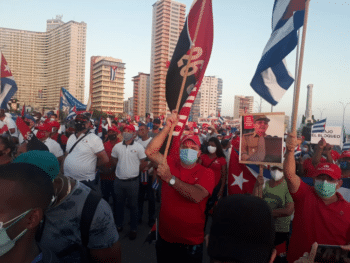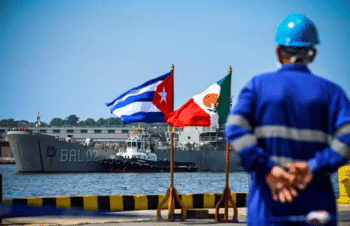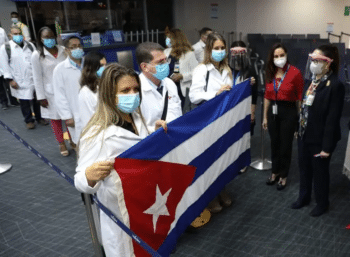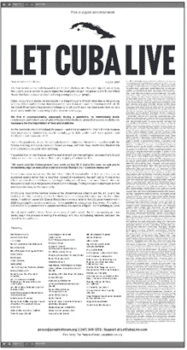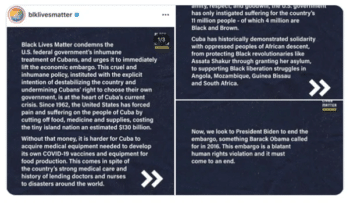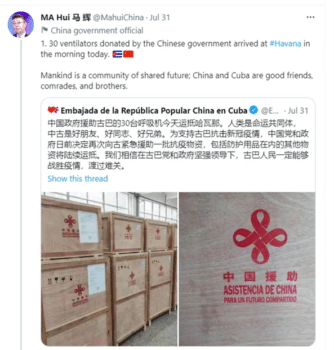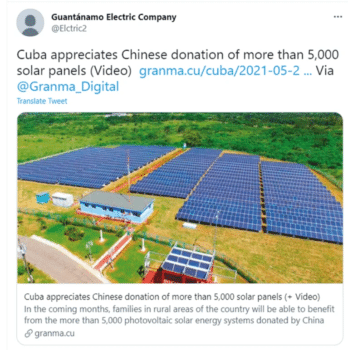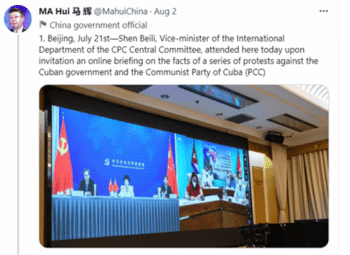The U.S. has just suffered a significant defeat in Afghanistan–weakening its position in central Asia. A second region where the U.S. is engaged in a serious foreign policy struggle is in Latin America–where there has been a new rise of forces pursuing a path of national independence instead of subordination to the US.. The immediate focus in this struggle has become the U.S. economic attack on Cuba. But because, on Cuba, the U.S. is going against the positions of the overwhelming majority of countries in the world, against the great majority of the Cuban people, and in violation of the U.S.’s own declared goals in terms of the global order, these is serious risk to the U.S. that it will also suffer a significant foreign policy defeat on this issue. This therefore makes it important to carefully analyse the unfolding of the situation around Cuba.
The U.S. attack on Cuba exposes the gap between reality and propaganda in U.S. foreign policy
The Biden administration has repeatedly declared, in order to attempt to gain international support and credibility for its policies, that the key principle of its foreign policy is to support a ‘rules based international order’. But the U.S.’s recent unilateral tightened embargo on Cuba, in open violation of an overwhelming vote in the United Nations, has immediately and transparently demonstrated that this U.S. claim is false. Because the great majority of countries have refused to go along with this U.S. unilateral attack on Cuba this has the potential to be a significant defeat for the U.S. not only in a failure to created a ‘colour counter-revolution’ in Cuba but also in terms of international ‘soft power’ and in international public opinion–a public demonstration to a global audience of the hypocritical positions of the U.S. China has a direct interest in this issue–as the U.S. has precisely been attempting to falsely claim that it stands for a ‘rules based international order’ in order to attempt to gain allies, and influence international public opinion, in favour of an aggressive policy towards China. Therefore, any demonstration that U.S. policy is in direct contradiction to a ‘rules based international order’ weakens the credibility of the U.S. and its ability to win over forces against China.
An earlier article 如果美国对古巴搞颜色革命成功,那么对中国…… analysed the objective alignment of international political forces around Cuba. The present article analyses the growing unfolding of the global reaction to the U.S. new attack on Cuba and the anti-US shifts in international public opinion it has revealed.
Biden’s U-turn on Cuba
The present aggressive policy of Biden towards Cuba is not merely in violation of the expressed positions of the huge majority of other countries but is even in contradiction to Biden’s policy during the U.S. presidential election campaign. During this campaign Biden promised to ‘go back’ to Obama type relations with Cuba as opposed to the bellicose policies of Trump. Biden furthermore explicitly argued that this was in the international interests of the U.S. due to the widespread international opposition to the U.S. embargo on Cuba: ‘This is more than about Cuba, it’s about all of the Caribbean and it’s about all of our friends and allies in Latin America.’ But in the exact opposite of this promised course the new presidential administration tightened the U.S. attack on Cuba. All 243 new sanctions against Cuba introduced by the Trump administration were maintained and new ones were introduced by the Biden administration.
The result, however, has precisely been widespread international public opposition to U.S. policy towards Cuba–as foreseen by Biden’s analysis during the presidential election campaign. This has spread from countries and movements which traditionally took a considerable interest in U.S. relations with Cuba to new areas which did not previously follow events in Cuba closely–including public opinion in China.
The U.S.’s closest allies refuse to support it on Cuba
The first sign of the failure of the new U.S. aggression towards Cuba is that even the U.S.’s closest allies have refused to support it. Simultaneously huge opposition to U.S. policy was shown in Latin America.
The Washington Post, analysing the U.S. failure to gain international support for its new attack on Cuba, noted: ‘When Secretary of State Antony Blinken released a statement this week designed to show how “democracies around the world are coming together” to support oppressed Cubans, the countries not listed as signatories were more notable than the 20 that were… Canada did not appear. Nor did Spain or major European allies or the European Union… the U.N. General Assembly last week voted 184 to 2 (the United States and Israel objected) to demand an end to the U.S. economic blockade.’
It further noted: ‘a meeting of the OAS [Organisation of American States] Permanent Council, called for Wednesday to address “the situation in Cuba,” was postponed indefinitely after many countries declined to attend.
‘Mexican President Andrés Manuel López Obrador on Saturday called Cuba an “example of resistance” and praised its ability to stand up to the United States, ABC News reported.
‘He called for the Organization of American States, which has often fallen under U.S. dominance, to be replaced “by a body that is truly autonomous, but not anybody’s lackey.”
‘“It is the considered opinion of our delegations that the proposed convocation of this meeting, which has been called without consultation, would be unproductive and would serve no useful purpose,” the head of the 14-member nations of the Caribbean Community wrote to the council chair.
A spokesperson from the Spanish Embassy in Washington said that “Spain decided not to participate in the joint statement published by the United States. . . . Other allies such as France, Germany, Italy, the United Kingdom and Portugal did not partake, either.”
Numerous of the 193 member states of the United Nations made public statements to defend Cuba against the U.S. campaign. In a statement, the 120 members of the Non-Aligned Movement (NAM) ‘strongly condemn[ed] the international campaign organized… with the purpose of destabilizing the Republic of Cuba.’ The NAM called for an immediate end to the U.S. blockade.
It may therefore be said that the U.S. has been able to gain essentially no significant international support for its policy on Cuba.
In response to the U.S. position, in addition to statements of opposition to U.S. policy, Russia, China, Nicaragua, Bolivia, and Mexico all declared they were sending practical aid to Cuba.
Failure within Cuba itself
Turning to forces outside U.S. allies, the first big U.S. failure was in Cuba itself. In addition to the economic blockade the U.S. has spent billions of dollars in attempting to internally destabilise Cuba–with measures ranging from the large scale, hostile TV and radio stations, payments of agents within Cuba, through numerous unsuccessful attempts to assassinate Fidel Castro, to the more bizarre attempts such as to float CIA satellite phones into Cuba disguised as surf boards.
After decades of failure, on the morning of 11 July the US/CIA was therefore ecstatic when a few hundred, or at most a few thousand people, some openly counter revolutionary, some expressing demands related to immediate economic and social issues, demonstrated in Cuba primarily in the town of San Antonio de los Baños. To give an accurate idea of the small scale of this the entire population of San Antonio de los Baños is only 46,000.
Cuban President Miguel Díaz-Canel referred to this situation as follows:
In a very cowardly, subtle and opportunistic and perverse way, from the most complicated situations that we have had in provinces such as Matanzas and Ciego de Ávila, those who have always approved the blockade and who serve as mercenaries of the Yankee blockade on the streets, begin to appear with doctrines of humanitarian aid and a “humanitarian corridor.” We all know where they come from.
When Cuba’s President Miguel Díaz-Canel heard the news of this rather small protest, he immediately went to to San Antonio de los Baños, where he met with the people. Simultaneously, in a highly unrealistic fashion in light of the very small numbers involved in this protest, Biden called for the overthrow of the Cuban government. In fact, on the evening of July 11, large numbers of Cubans, very many times the size of the reactionary events, demonstrated in a large number of cities across Cuba in support of the government and of the revolution–the demonstration in Havana alone was estimated at up to 200,000. Since Sunday 11 July, Cuba has been calm, with essentially zero people following U.S. calls for demonstrations.
Why the Cuban attempted ‘colour counter-revolution’ had no significant social base
This social and political isolation of the reactionaries in Cuba is no surprise. Prior to the revolution of 1959 Cuba was a playground not only for the U.S. as a whole, and the comprador elements within Cuba, but directly extreme criminal and corrupt elements within the U.S. Cuba was a centre of gambling, of prostitution and the most degrading human practices, while every aspect of Cuba’s foreign policy was subordinate to the U.S. Today Cuba, on the contrary, not only follows a nationally independent foreign policy, with good relations with China, but in terms of its social advance it now has a longer life expectancy than the U.S..
Cuba, far from its old position of being a centre of gambling and crime, now has one of the most advanced biological and medical services in the world–it has developed five vaccines against Covid. For Cuban women the choice is even more stark. Today they can very realistically envisage careers as scientists or doctors–hundreds of thousands of Cuban women have such positions. Under the previous U.S. dominated regime, the threat to them was to be forced into prostitution because of poverty. Given this difference in life little wonder that the supporters of the U.S. in Cuba are popularly known as ‘gusanos’ (worms)!
Certainly, the combination of the long-term U.S. economic blockade and the impact of COVID-19 has created real problems in Cuba but given the fundamental choice faced between a path of national independence and socialism and subordination to the U.S. the choice is very clear. This is why those agitating for a ‘colour counter-revolution’ in Cuba picked up only extremely peripheral support.
Within the U.S.
While the refusal even of U.S. allies to support its position on Cuba, as well as the huge majority opposition in Latin America to U.S. policy to Cuba, reflected the expression of pre-existing positions a new factor was the expression of active opposition to U.S. policy towards Cuba in the U.S. itself.
On July 23, a full-page Open Letter appeared in the New York Times under the headline, “Let Cuba Live.” The advertisement was signed by more than 400 well known U.S. and international figures led by Oscar winners Jane Fonda, Emma Thompson, and Susan Sarandon, film stars Danny Glover and Mark Ruffalo, and Daniel Ellsberg, the famous exposer of the real goals of the U.S. in Vietnam in the ‘Pentagon Papers’. Other signatories included former president of Brazil Lula, former president of Ecuador Rafael Correa, former leader of the British Labour Party Jeremy Corbyn, and Nobel Peace Prize winner Adolfo Perez Esquivel. This Open Letter called on Biden to end Trump’s ‘coercive measures’ and to ‘begin the process of ending the embargo.’
Black Lives Matter movement condemns the U.S. embargo on Cuba
In addition to well-known personalities signing the open letter in the New York Times a number of significant U.S. individuals and organisations issued strong attacks on U.S. policy on Cuba. For example, the Black Lives Matter movement, which had led the mass protests in 2020 against the policy murder of George Floyd, and which was an important part of the coalition of forces which secured the election of Biden in 2020, issued the follow unambiguous statement:
Black Lives Matter condemns the U.S. Federal Government’s treatment of Cubans, and urges it to immediately lift the economic embargo. This cruel and inhumane policy, instituted with the explicit intention of destabilising the country and undermining Cubans’ right to choose their own government, is at the heart of Cuba’s current crisis. Since 1962, the United States has forced pain and suffering on the people of Cuba by cutting off food, medicine and supplies, costing the tiny island nation an estimated $130 billion.
Without this money, it is harder for Cuba to acquire medical equipment needed to develop its own COVID-19 vaccines and equipment for food production. This comes in spite of the country’s strong medical care and history of lending doctors and nurses to disasters around the world.
The people of Cuba are being punished by the U.S. government because the country has maintained its commitment to sovereignty and self-determination. United States leaders have tried to crush this Revolution for decades. Instead of international amity, respect, and goodwill, the U.S. government has only instigated suffering for the country’s 11 million people–of which 4 million are Black and Brown.
Cuba has historically demonstrated solidarity with oppressed peoples of African descent, from protecting Black revolutionaries like Assata Shakur through granting her asylum, to supporting Black liberation struggles in Angola, Mozambique, Guinea Bissau and South Africa.
Now, we look to President Biden to end the embargo, something Barack Obama called for in 2016. This embargo is a blatant human rights violation and it must come to an end.
US political figures condemn the embargo against Cuba
While there was more confusion among progressive members of the U.S. Congress on the immediate events in Cuba they nevertheless clearly opposed the U.S. embargo. Senator Bernie Sanders for example declared:
It’s… long past time to end the unilateral U.S. embargo on Cuba, which has only hurt, not helped, the Cuban people.
Member of the House of Representatives Alexandria Ocasio-Cortez stated it ‘is absurdly cruel and, like too many other U.S. policies targeting Latin Americans, the cruelty is the point. I outright reject the Biden administration’s defence of the embargo. It is never acceptable for us to use cruelty as a point of leverage against every day people.’
The well-known U.S. magazine The Nation also launched a fierce attack on U.S. policy towards Cuba:
Cuba’s achievements in health are a model and a demonstrable benefit for the entire world—one that the United States should be supporting. This is a country that is developing its economy through health and education—a project that began 60 years ago with rural literacy and health campaigns. Cuba’s public health system has allowed it to outperform much of the world in terms of life expectancy, infant mortality and, most recently, per capita pandemic statistics.
On the first day of the new administration, President Biden issued a national security directive calling for a review of the impact of sanctions on the response to the pandemic, with an eye toward offering relief. Hope for a sensible U.S. policy toward Cuba was once again kindled. Now, almost half a year into the Biden administration, the Trump-era policies of “maximum pressure” remain in place. The White House has made it clear that improving Cuba-US relations—and with them, the daily lives of the Cuban people—is not a priority.
It is important not to exaggerate this situation in the U.S. The forces within the U.S. against Biden’s policy were undoubtedly a minority. But, coupled with the overwhelming opposition by countries outside the U.S. to its policy to Cuba, this opposition even within the U.S. itself highlighted the international isolation of the U.S. on the issue of Cuba. This display not only of opposition outside the U.S. but even within it therefore had a significant international impact–the U.S. position on Cuba faced overwhelming opposition internationally and significant opposition even within its own borders.
China
This international situation intersected with China’s position on Cuba. There are, of course, strong historical links between China’s and Cuba’s leaderships. These were analysed in 如果美国对古巴搞颜色革命成功,那么对中国……
They may be simply summed up. Fidel Castro stated: ‘Xi Jinping is one of the strongest and most capable revolutionary leaders I have met in my life.’ Xi Jinping stated of Fidel Castro on his death: ‘I met with Comrade Fidel Castro many times and held in-depth conversations with him. His real knowledge and deep insight inspired me as his voice and expression live in my memory. Both I and the Chinese people miss him deeply.’ Cuba’s present president Miguel Diaz-Canel spoke at the recent Summit of the CPC and World Political Parties.
Nevertheless, despite these strong links at the level of the leadership, it would be fair to say that events concerning Cuba had not recently been strongly followed by China’s mass public opinion. To take a quantifiable measure, the Weibo of Cuban embassy in China’s 472,000 followers is not insignificant but cannot be said it is very large. Normally tweets by the Cuban embassy may expect to get a few hundred likes. But the Open Letter in the New York Times opposing U.S. policy to Cuba picked up a totally different and higher level of interest–it received 86,000 hits.
Statements of China’s Foreign Ministry
China’s Foreign Ministry position on the latest U.S. attacks on Cuba has been unequivocally clear in its opposition from the beginning. It was summed up by the spokesperson for the Foreign Minister on 4 August: ‘China firmly opposes any move to arbitrarily impose unilateral sanctions and interfere in other countries’ internal affairs under the pretext of so-called “freedom”, “human rights” and “democracy”. The recent U.S. sanctions against Cuban institution and officials severely violate the basic norms governing international relations and once again demonstrate to the world the typical U.S.-style double standard and bullyism. As is known to all, it is the economic, commercial and financial embargo of the U.S. that gravely impedes Cuba’s efforts to improve its economy and people’s livelihood, and tramples on the Cuban people’s right to subsistence and development. We urge the U.S. to heed the universal appeal of the international community, immediately and completely lift the sanctions and embargo against Cuba, and immediately stop making excuses to engage in gross interference and destabilization.
‘Enough with sanctions! The right way is to support. Recently, China and many other friendly countries and international organizations have extended a helping hand to Cuba, aiding the Cuban government and people to fight the epidemic and improve people’s livelihood, illustrating that true friendship stands the test of adversity. China will continue to implement the consensus reached by the leaders of the two countries, deepen China-Cuba friendly relations and firmly support Cuba’s efforts to overcome the impact of the epidemic, promote economic development and maintain social stability.’
China’s embassy in Cuba
China’s Embassy in Cuba has also been extremely active in statements opposing U.S. policy towards Cuba. In addition to publicising the political declarations by China’s foreign ministry it also announced the delivery of items of practical aid from China to Cuba.
The first of these, on 31 July, was the delivery of ventilators from China to Cuba. An aid delivery of personal protection equipment was also announced. China’s Ambassador to Cuba declared: ‘30 ventilators donated by the Chinese government arrived at Havana in the morning today. Mankind is a community of shared future; China and Cuba are good friends, comrades, and brothers. To help the Cuban people fight the latest wave of the COVID-19 outbreak, the Chinese government decided to provide a new batch of emergency medical supplies. Other supplies including PPEs will arrive soon. We are confident that under the leadership of the Cuban party and government the Cuban people will overcome the difficulties and bring the epidemic under control.’
China then announced the delivery of 5,000 solar panels to Cuba–regions of Cuba have suffered power cuts and its climate of course makes solar power an extremely efficient energy source.
China’s Embassy on Cuba also tweeted extensively the political statements made by China on the U.S. embargo against Cuba. It recalled that Cuba, after its revolution, had been the first country in Latin America to establish diplomatic relations with the People’s Republic of China.
China’s Embassy in Cuba clearly explained China’s position on the latest events. It noted on 21 July that Shen Beili, vice-minister of the international department of the CPC Central Committee, attended an online briefing on the facts of a series of protests against the Cuban government and the Communist Party of Cuba (PCC). This event was held by the PCC and the Sao Paulo Forum–an organisation of numerous social movements in Latin America. Rogelia Polanco Fuentes, Member of the Central Committee and Head of the Ideological Department of the Central Committee of the PCC briefed on the current situation in Cuba, and the truth about the protests against the Cuban government. Polanco said that the protests on 11 July were social turmoils caused by agents of a handful of anti-Cuba forces, with the aim of overthrowing the Cuban government. The PCC and Cuban government called on the Cuban people to stand in solidarity against external interference, defend the outcomes of the Cuban revolution and to condemn the U.S. long-term blockade on Cuba.
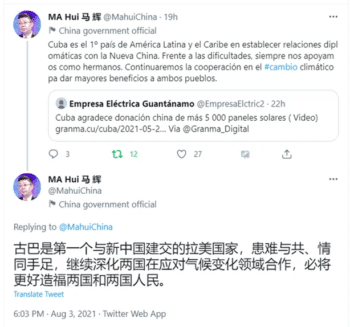
China’s Ambassador to Cuba noting that Cuba, after its revolution, had been the first country in Latin America to establish diplomatic relations with the People’s Republic of China.
China’s representative stated that the Chinese side firmly supports Cuba’s exploration for a development path consistent with national realities, opposed external interference in Cuba’s internal affairs, supported Cuba in fighting COVID-19, and in improving the people’s livelihood and maintaining stability, and remains committed to deepening the China-Cuba friendship.
Geopolitical consequences of the isolation of the U.S. in its attack on Cuba
The above situation indicates that its latest attack on Cuba risks turning into a significant defeat for the U.S. This is because the U.S. has entered into a struggle on an unfavourable terrain:
- The events in Cuba since 11 July demonstrate that the U.S. has no major significant support within Cuba itself. Not only Cuba’s government but a crushing majority of the Cuban population oppose the counterrevolutionaries. Indeed the latter, apart from one morning of relatively small protests, have been unable to mount any significant popular mobilisations while large actions took place in favour of the Cuban government. This social and political dynamic therefore confirms there is no significant chance of a colour counter-revolution being mounted inside Cuba itself.
- An overwhelming majority of countries have opposed the new U.S. aggression against Cuba and even the U.S.’s closest allies have not supported it. There is opposition even within the U.S. to its policies.
- While Cuba is certainly suffering significant material hardships, due to the direct and indirect impact of COVID19, in particular because of its cutting off of tourism, because Cuba is a small country, the aid required to solve its problems is very small compared to the resources of countries which oppose U.S. policy–Russia, China, large Latin American countries.
Given this situation the U.S. has embarked on what is one of the least strong forms of foreign policy–bluff. The U.S. acted as though if it made a big noise other countries would back down and support its attack on Cuba. But unless other countries back down in their support for Cuba the U.S. cannot succeed in its attempt to carry out a “colour counterrevolution’ in Cuba and cannot gain the geopolitical advantage against other countries it calculated would result from this. Biden’s policy has therefore been a miscalculation. Unless other countries can be bluffed into not supporting Cuba, Biden would have been better advised to adhere to his electoral campaign position. Instead, his present policy has sharply revealed the almost complete lack of support for the new U.S. aggression towards Cuba.
The most fundamental reason for supporting Cuba is for international justice. Cuba is a country which wishes to pursue a policy of national independence. Cuba has no interest in pursuing a policy of confrontation with the U.S., on the contrary Cuba’s policy is to seek normal economic and political relations with the U.S. But Cuba does seek a situation where it can pursue its independent national interests and decide its own path of development. This is unacceptable to the U.S.
For this reason, essentially all political forces in Latin America seeking a path of national independence, and therefore also in almost all cases good relations with China, support Cuba. Cuba is consequently a central part of this movement for national independence in Latin America. It is particularly because this movement has recently been gaining success–winning presidential elections in Peru and Bolivia, and with former president Lula hugely ahead in the opinion polls for Brazil’s 2022 presidential election–that the U.S. has felt the necessity to intensify its attack on Cuba. If this U.S. attack on Cuba fails, these forces seeking national independence in Latin America will be strengthened.
Consequences for China
But this situation has major implications for China–both specifically in Latin America and in general in the fight against the new U.S. cold war against China. Within Latin America those countries seeking a path of national independence, in order to pursue this, invariably seek good relations with China. This was seen clearly, for example, during the period of Presidents Lula and Rousseff in Brazil, or President Morales in Bolivia–and now President Arce in the same country. Similarly Reuters reported on Peru’s newly election President Castillo’s early actions under the self-explanatory headline: ‘Peru’s new leftist president prioritizes China ties during early days in office.’ Reuters noted: ‘In his first week in office, Peru’s new… President Pedro Castillo has been quick to extend a friendly hand to China, the Andean nation’s most important commercial partner… Since Castillo was inaugurated on July 28, administration officials have met with the Chinese ambassador and Chinese mining executives to discuss not just policies for their industry but also to strengthen a previous free trade agreement.’ In a clear political signal Castillo also opted to be inoculated against COVID with China’s Sinopharm vaccine.
But the geopolitical effects of the outcome of the struggle around the new U.S. attack on Cuba goes well beyond Latin America. As already noted, the U.S. political campaign against China, the claim by the U.S. that it stands for a ‘rules based international order’, as against supposedly aggressive unilateral actions by China, is entirely refuted by the fact that the U.S. is openly acting against the will of the overwhelming majority of countries, and the votes of the UN, on Cuba.
The chaos following U.S. military action against Iraq, Afghanistan and Libya, both within these individual countries and across whole regions, destroyed the international credibility of the U.S. claim that it carried out its military actions for ‘humanitarian’ reasons. The current U.S. attacks on Cuba also demonstrates that U.S. claims to stand for a ‘rule based international order’ are entirely false. This open demonstration that the U.S. position on a ‘rules based international order’ is entirely untrue hypocrisy therefore significantly weakens the credibility of U.S. ideological campaigns against China.
Latin America also has a direct geopolitical effect in the UN as a number of countries there help give a majority to China against U.S. attacks on China on issues such as Hong Kong and Xinjiang–Cuba directly played the lead role in the recent defeat in the UN of the U.S. position on Xinjiang.
In short, in addition to international justice, and expressing the openly expressed views of the overwhelming majority of countries, China has a direct interest in the failure of this U.S. attack on Cuba. Indeed, the two issues are interconnected–it is because the overwhelming majority of countries oppose U.S. policy towards Cuba that China gains international support by very firmly expressing the same position.
Risk of failure of the U.S. policy towards Cuba
The U.S. therefore now faces a significant risk which can affect its geopolitical position. The U.S. is unable to carry out a ‘colour counter-revolution’ in Cuba because of the relation of forces in that country. Meanwhile U.S. policy on Cuba is opposed by an overwhelming number of counties. In short, Biden’s earlier statement during the Presidential election campaign was correct: ‘This is more than about Cuba, it’s about all of the Caribbean and it’s about all of our friends and allies in Latin America.’ He might now add that by adopting an attack on Cuba which is opposed by the overwhelming majority of countries, and in open violation of the U.S.’s main ideological claim to international legitimacy, the U.S.’s geopolitical position risks being weakened.
Cuba is a small country. But because it became in 1959 the first country in the Western hemisphere to thoroughly break with U.S. domination, and embark on a path of national independence, events concerning Cuba have a geopolitical significance many times greater than its size. Present events show that this continues to be the case.
Conclusion
In summary, the objective significance of recent events concerning Cuba was already clear when recent events began on 11 July–as analysed in 如果美国对古巴搞颜色革命成功,那么对中国……. These objective reality have now begun to work themselves through into international opinion and geopolitics as analysed above. Given the significant U.S. miscalculation in launching an attack on Cuba which is opposed by the overwhelming majority of the world’s countries the significance of these shifts around Cuba will deepen in the coming period, including with consequences for China. It will therefore be important to follow events around Cuba extremely closely.


